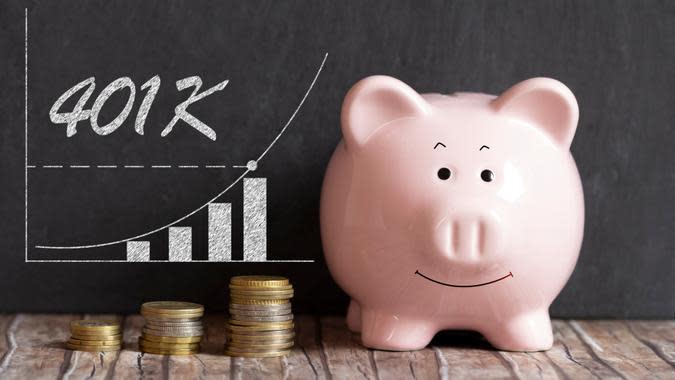8 Retirement Planning Tips Everyone Can Learn From the FIRE Movement

Over 39% of Americans want to retire before the age of 63, according to a recent GOBankingRates survey of 997 adults. Retiring early isn't a recent fad -- it's the main goal behind the FIRE (Financial Independence, Retire Early) movement.
Social Security: Women Get $354 Per Month Less Than Men - Here's Why
Important: 7 Surprisingly Easy Ways To Reach Your Retirement Goals
Many FIRE followers strive to save about 30 times their annual expenses so they can retire in their 40s or 50s. Then in retirement, they can pull small portions from their savings for regular living expenses. But what if you don't plan on retiring early, how can the FIRE movement help you? Here are several FIRE principles you can still follow, according to financial experts.

Save as Much of Your Income as Possible
The more you save and invest now, the more financially comfortable you may be in retirement. Henry Gibson-Garcia, a financial adviser with Plan & Act, said he's seen some people in the FIRE movement invest as much as 75% of their income so they can retire early -- although he typically recommends saving only up to 50%.
"Having a limit decreases the possibility of burnout and increases the likelihood of success," he said.
If saving 50% of your income isn't feasible, start with a lower number and work your way up, said Teresa Arrigo, a financial advisor at GenWealth Financial Advisors.
Even saving 10%-15% of your income for retirement can go a long way if you do it consistently, especially if you don't plan to retire early. Putting those savings in a retirement plan -- such as a traditional or Roth IRA or an employer-sponsored 401(k) -- will also allow your money to grow over time.
Live Richer Podcast: Unexpected Ways Losing a Spouse Can Affect Your Finances and Retirement

Eliminate Debt as Fast as You Can
For those planning to retire early, eliminating debt is a top priority, Arrigo said. After all, the faster you pay off your debts, the less you pay in interest in the long run.
Saving an extra percentage of your income to pay off student loans, mortgages, car loans and credit card debt early can free you to save -- or just enjoy -- even more of your income in the future.

Live Below Your Means
The only way to save and pay off debt is to live below your means, which requires discipline and diligence, Arrigo said.
To cut costs, many FIRE followers choose to eat at home instead of regularly dining out. You can also shop in bulk, take advantage of discounts and coupons, and purchase clothing and shoes at secondhand stores.

Maximize Your Employer's 401(k) Matching Plan
If you have an employer plan, make sure you are maximizing the available match.
"Each time you get a raise, increase your contribution by 1-2% to increase those savings over time," Arrigo said.

Invest In Low-Cost Mutual Funds
Trying to time the market is often a waste of time and money, Gibson-Garcia said -- especially when you account for trading costs.
"Low-cost and efficient mutual funds involve much less work--just set them up and let them go!" he said.

Diversify Your Investments
Gibson-Garcia also recommends having the right mix of stocks and bonds to get the maximum return. To find that balance, determine your level of risk tolerance and your needs in retirement. Also, consider hiring a financial advisor who can help you find investments that are a match for you.

Take Advantage of Tax Benefits
Gibson-Garcia regularly encourages his clients to optimize their taxes.
"People who aren't tax efficient are leaving money on the table every single year," he said.
One way to lower your tax bill is to increase your tax-deductible contributions to a healthcare plan such as an FSA or HSA, a college fund such as a 529 plan or a retirement plan such as a traditional IRA or a 401(k).
You can also hire a CPA to walk you through which tax deductions you can safely take.

Have a Vision for Your Retirement
Part of what motivates FIRE followers to spend less and save more is their dream of retiring early. Having a clear picture of what you want your retirement to look like can help you keep going when you feel discouraged.
Do you want to travel, take nice vacations, visit family often, volunteer or live in a nice neighborhood? Let your vision for retirement spur you on to continue managing your money wisely.
"You can't determine how much to save until you know how much required or desired income you will need," Arrigo said. "So knowing what you want to do in retirement can help your advisor create your plan."
More From GOBankingRates
Check Out Readers' Favorite Small Businesses in Our 2022 Small Business Spotlight
This Credit Score Mistake Could Be Costing Millions Of Americans
4 Ways Women Can Prepare Their Finances for Unexpected Life-Changing Events
Methodology: GOBankingRates surveyed 997 Americans aged 18 and older from across the country between August 9 and August 11, 2022, asking sixteen different questions: (1) How much money do you currently have saved for retirement?; (2) How much money do you think you'll need to retire?; (3) Realistically, at what age do you want to be retired?; (4) At what age did you start saving for retirement?; (5) What worries you financially about retirement? (Select all that apply); (6) Do you plan to work in retirement?; (7) What assets do you have in your retirement portfolio? (select all that apply); (8) How has the current inflation impacted your retirement plans?; (9) How much of your retirement do you plan to fund with Social Security?; (10) How do you feel about the future of Social Security when you retire?; (11) What percentage of your salary are you currently investing for retirement?; (12) Are you planning to move after your retirement?; (13) Where is your ideal place to retire?; (14) What government programs do you plan to use for your retirement? (select all that apply); (15) Do you have a pension plan?; and (16) How much do you think the average American has saved at the time they retire?. GOBankingRates used PureSpectrum's survey platform to conduct the poll.
This article originally appeared on GOBankingRates.com: 8 Retirement Planning Tips Everyone Can Learn From the FIRE Movement

